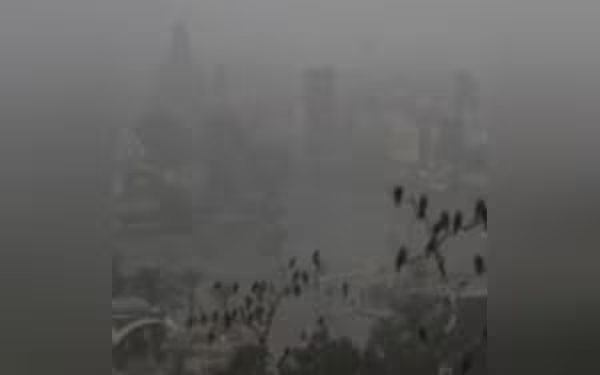Saturday, November 23, 2024 08:10 PM
Severe Smog Crisis Disrupts Life in Punjab
- Lahore's AQI reaches hazardous level of 766.
- Punjab government declares health emergency.
- Schools shift to online classes due to smog.
 Image Credits: pakistantoday
Image Credits: pakistantodayPunjab faces a severe smog crisis, with Lahore's AQI at 766, prompting health emergencies and school closures.
LAHORE: The province of Punjab is currently facing a significant challenge as it deals with a severe smog crisis. This annual phenomenon has become a recurring issue, particularly in the capital city of Lahore, which has once again found itself at the top of the list of cities worldwide with the worst air quality. Each winter, Punjab experiences this thick blanket of smog, but the situation has worsened in recent years due to various factors, including cold air trapping dust, low-grade diesel emissions, and smoke from illegal stubble burning in agricultural fields.
On Saturday, the air quality index (AQI) in Lahore reached a staggering “hazardous” level of 766. This alarming figure indicates a significant decline in air quality over the past month. According to a live air quality monitor from a Swiss group, the concentration of PM2.5 pollutants—tiny particles that pose serious health risks—was found to be 87.4 times higher than the World Health Organization’s (WHO) recommended annual air quality guideline value around 9 AM. Meanwhile, Multan, another major city in Punjab, reported an AQI of 396, which, although lower than the previous week, still falls within the hazardous range.
In contrast, Karachi, the largest city in Pakistan, recorded the sixth worst air quality globally, with an AQI of 188, categorized as “unhealthy.” The hazardous smog has severely disrupted daily life, leading to poor visibility, traffic congestion, and health concerns for residents. Major roads have been affected, with the M4 Motorway blocked from Multan to Toba Tek Singh and the M5 Motorway closed from Multan to Sukkur. In response to the deteriorating conditions, the district administration has announced that all markets in Lahore will remain closed for two days this weekend—Saturday and Sunday.
Additionally, the Punjab government has declared a health emergency in Lahore and Multan, resulting in the cancellation of leaves for medical staff. Schools have been closed for an additional week, and all educational institutions have shifted to online classes to protect students from the harmful effects of the smog. Public spaces such as parks, zoos, and playgrounds have also restricted entry to ensure the safety of citizens.
Tragically, the smog has led to accidents, including a recent incident where a man lost his life after being struck by a trailer in Rajanpur, with police attributing the accident to low visibility caused by the thick fog. As the situation remains dire, residents are advised to stay indoors and limit unnecessary travel.
The ongoing smog crisis in Punjab serves as a stark reminder of the urgent need for effective measures to combat air pollution. While the government has taken steps to address the immediate health risks, long-term solutions are essential to ensure cleaner air for future generations. It is crucial for individuals, communities, and authorities to work together to tackle this pressing issue, as the health and well-being of millions depend on it.













